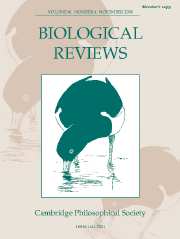Crossref Citations
This article has been cited by the following publications. This list is generated based on data provided by
Crossref.
Madden, Joah Robert
2002.
Bower decorations attract females but provoke other male spotted bowerbirds: bower owners resolve this trade-off.
Proceedings of the Royal Society of London. Series B: Biological Sciences,
Vol. 269,
Issue. 1498,
p.
1347.
Kotiaho, Janne S.
and
Simmons, Leigh W.
2003.
Longevity cost of reproduction for males but no longevity cost of mating or courtship for females in the male-dimorphic dung beetle Onthophagus binodis.
Journal of Insect Physiology,
Vol. 49,
Issue. 9,
p.
817.
Lehmann, Gerlind U.C.
2003.
Review of Biogeography, Host Range and Evolution of Acoustic Hunting in Ormiini (Insecta, Diptera, Tachinidae), Parasitoids of Night-calling Bushcrickets and Crickets (Insecta, Orthoptera, Ensifera).
Zoologischer Anzeiger - A Journal of Comparative Zoology,
Vol. 242,
Issue. 2,
p.
107.
RANTALA, MARKUS J.
and
KORTET, RAINE
2003.
Courtship song and immune function in the field cricket Gryllus bimaculatus.
Biological Journal of the Linnean Society,
Vol. 79,
Issue. 3,
p.
503.
Rantala, Markus J.
Kortet, Raine
Kotiaho, Janne S.
Vainikka, Anssi
and
Suhonen, Jukka
2003.
Condition dependence of pheromones and immune function in the grain beetle Tenebrio molitor.
Functional Ecology,
Vol. 17,
Issue. 4,
p.
534.
Morrow, Edward H.
and
Pitcher, Trevor E.
2003.
Sexual selection and the risk of extinction in birds.
Proceedings of the Royal Society of London. Series B: Biological Sciences,
Vol. 270,
Issue. 1526,
p.
1793.
Rantala, Markus J.
Vainikka, Anssi
and
Kortet, Raine
2003.
The role of juvenile hormone in immune function and pheromone production trade-offs: a test of the immunocompetence handicap principle.
Proceedings of the Royal Society of London. Series B: Biological Sciences,
Vol. 270,
Issue. 1530,
p.
2257.
Polak, Michal
Starmer, William T.
and
Wolf, Larry L.
2004.
SEXUAL SELECTION FOR SIZE AND SYMMETRY IN A DIVERSIFYING SECONDARY SEXUAL CHARACTER IN DROSOPHILA BIPECTINATA DUDA (DIPTERA: DROSOPHILIDAE).
Evolution,
Vol. 58,
Issue. 3,
p.
597.
Wong, Bob B. M.
Cowling, A. N. N.
Cunningham, Ross B.
Donnelly, Christine F.
and
Paul D. Cooper
2004.
Do temperature and social environment interact to affect call rate in frogs (Crinia signifera)?.
Austral Ecology,
Vol. 29,
Issue. 2,
p.
209.
Svensson, O.
Nyman, A.
and
Kvarnemo, C.
2004.
Costly courtship or dishonest display? Intensely displaying sand goby males have lower lipid content.
Journal of Fish Biology,
Vol. 64,
Issue. 5,
p.
1425.
Ahtiainen, Jari J.
Alatalo, Rauno V.
Mappes, Johanna
and
Vertainen, Laura
2004.
Decreased sexual signalling reveals reduced viability in small populations of the drumming wolf spiderHygrolycosa rubrofasciata.
Proceedings of the Royal Society of London. Series B: Biological Sciences,
Vol. 271,
Issue. 1550,
p.
1839.
Amo, Luisa
López, Pilar
and
Martín, José
2004.
Chemosensory Recognition of Its Lizard Prey by the Ambush Smooth Snake, Coronella austriaca.
Journal of Herpetology,
Vol. 38,
Issue. 3,
p.
451.
Bertram, Susan M.
Xochitl Orozco, S.
and
Bellani, Rudy
2004.
Temporal Shifts in Conspicuousness: Mate Attraction Displays of the Texas Field Cricket, Gryllus texensis.
Ethology,
Vol. 110,
Issue. 12,
p.
963.
Hunt, John
Brooks, Robert
Jennions, Michael D.
Smith, Michael J.
Bentsen, Caroline L.
and
Bussière, Luc F.
2004.
High-quality male field crickets invest heavily in sexual display but die young.
Nature,
Vol. 432,
Issue. 7020,
p.
1024.
Wong, Bob B. M.
Cowling, A. N. N.
Cunningham, Ross B.
Donnelly, Christine F.
and
Paul D. Cooper
2004.
Do temperature and social environment interact to affect call rate in frogs (Crinia signifera)?.
Austral Ecology,
Vol. 29,
Issue. 2,
p.
209.
Roberts, M.L.
Buchanan, K.L.
and
Evans, M.R.
2004.
Testing the immunocompetence handicap hypothesis: a review of the evidence.
Animal Behaviour,
Vol. 68,
Issue. 2,
p.
227.
Polak, Michal
and
Starmer, William T.
2005.
ENVIRONMENTAL ORIGINS OF SEXUALLY SELECTED VARIATION AND A CRITIQUE OF THE FLUCTUATING ASYMMETRY–SEXUAL SELECTION HYPOTHESIS.
Evolution,
Vol. 59,
Issue. 3,
p.
577.
Ward, S.
and
Slater, P. J. B.
2005.
Heat transfer and the energetic cost of singing by canaries Serinus canaria.
Journal of Comparative Physiology A,
Vol. 191,
Issue. 10,
p.
953.
Hunt, John
Brooks, Robert
and
Jennions, Michael D.
2005.
Female Mate Choice as a Condition‐Dependent Life‐History Trait.
The American Naturalist,
Vol. 166,
Issue. 1,
p.
79.
Paukku, Satu
and
Kotiaho, Janne S.
2005.
Cost of reproduction in Callosobruchus maculatus: effects of mating on male longevity and the effect of male mating status on female longevity.
Journal of Insect Physiology,
Vol. 51,
Issue. 11,
p.
1220.


